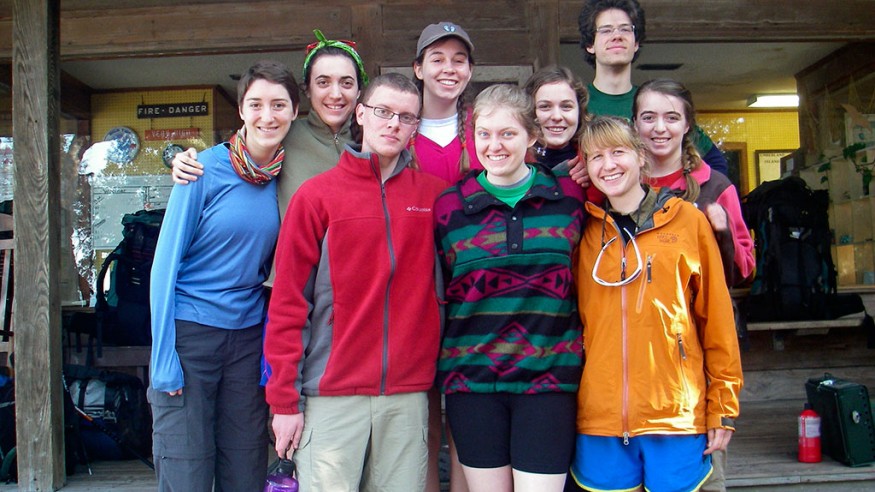
Out into the Woods…and Mountains
The Georgia group consisted of: (left to right) Raina Graham ’16, Camille Mullins-Lemieux ’16, Mark Mandych ’15, Cora Munroe ’13, Claudia Bauman ’16, Holly Sobole ’16, Jamie Zackavitch (instructor), Luke Steffen ’15, Lili Fikter ’15. (Photo courtesy of William Hayes)
“Real time” leadership and decision making. These are accurate descriptors of Ohio Wesleyan’s annual Spring Break Wilderness Trek program, now in its 12th year.
And the 2013 trips—backpacking and kayaking in the Georgia Sea Islands and rock climbing and service in Joshua Tree National Park and Los Angeles—did not disappoint the 17 OWU students who participated, according to William Hayes, associate chaplain and Director of Wilderness Ministry.
The theme of the Georgia group was “Identity and Rest,” enabling them to learn about the wildlife (alligators, birds, dolphins, and armadillos), outdoor living skills, and how to incorporate solitude and reflection into their daily lives. No cell phones, computers, i-Pads were to be found.
“It was a time for me to unplug from my world and just exist,” says Cora Munroe ’14, who co-led the group of eight. She was responsible for all of the team meetings leading up to the trip, which taught her more about responsibility and self-confidence. “When I didn’t know a certain wilderness skill, I looked to my co-leader for guidance, which reminded me about the importance of humility,” she admits. As someone who likes having schedules, she realized something else. “Dealing with unplanned mishaps [on the trip] helped me see that I can survive just fine if things don’t follow my plan,” says Munroe. A little spontaneity can be good.”
The “California Nine” consisted of: (back row, left to right) Alyson Michael ’13, Challen Brown ’14, Justin Bellassai ’14, Ellen Hughes ’16, William Hayes, Ashley Taylor ’13, Haley Figlestahler ’13; (front row, left to right) Makenna Huff ’14, Alexa Katrinchak ’14, Sarah Foster ’13. (Photo courtesy of William Hayes)
Leading the “California Nine,” Hayes and the students explored the park, wildlife and did rock climbing, also making time each day for reflection. Then, they headed to the city to serve with an urban outreach group, World Impact. Following the group’s theme, “Head, Heart, and Hands,” students worked with a food pantry near Skid Row, also discussing how faith connects on so many levels.
For co-leader Makenna Huff ’14, it was a time for learning practical organizational and discussion tools. “I became a lot more self-confident,” she says, adding that her shyness diminished as she had a chance to take charge and move outside her comfort zone. “In that uncomfortable state, I had to recognize and rely on my own skills. I think having stronger self-condidence is practically the definition of good leadership. That sense of security in myself hasn’t left yet, so I know this is more than a phase.”
